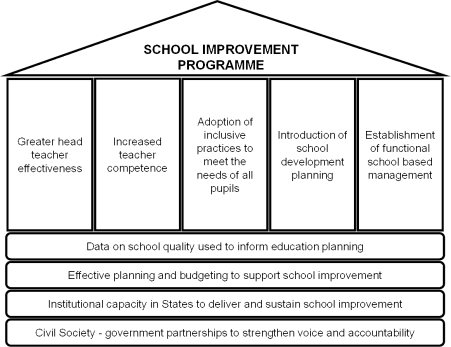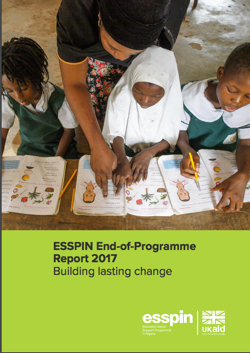ESSPIN was one of a set of UK aid-funded State Level Programmes (SLPs), working in governance, accountability and the delivery of health and education services. DFID-ESSPIN supported federal and state authorities as they work both to reform the governance of education and to improve the quality of education that children receive.
Over eight and a half years, ESSPIN embedded an integrated school improvement programme at scale. The programme built the capacity of thousands of state and district staff, head teachers, teachers, civil society organisations and school-based management committee members to improve education in their primary schools.
ESSPIN’s Integrated School Development as represented by the diagram below stressed the importance of paying attention to all the components represented by the columns as responsible for improved school quality. The components for governance represent the foundation which are necessary for raising learning achievement.
Its approach had been to support the School Improvement Programmes (SIPs) of State Governments through systems strengthening, improved school quality and governance. The programme
- Supported federal and state ministries of education, and Local Government Education Authorities (LGEA) in formulating and operationalising policies around issues that affect children’s learning inclusion through series of political engagements, trainings, modelling, planning and budgeting, and monitoring and evaluation
- Used existing structure and staff but with reorganisation for greater effectiveness and sustainability, encouraging synergy among all departments at states and LGEA levels
- Built the capacity of communities within the state and local government systems including CSOs, CBOs, FBOs, SBMCs
- Supported the state governments to commit their own resources to school improvement programme in terms of improved and transparent budgeting (within states’ limited budget envelopes)
The programme also supported non-formal education and worked to improve educational provisions in nomadic and IQTE settings.
ESSPIN started with a pilot in 2,000 schools rapidly expanding to over 16,000 schools by 2017. The £124m programme was managed by a consortium led by Cambridge Education.

 Read ESSPIN End of Programme Report
Read ESSPIN End of Programme Report